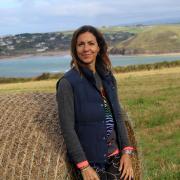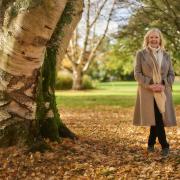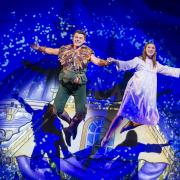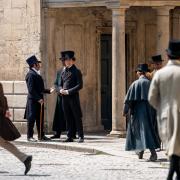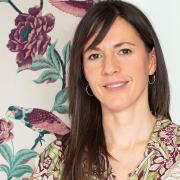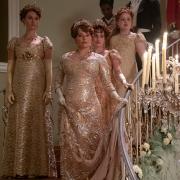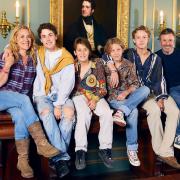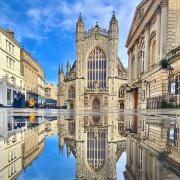We sat down with the bestselling author to discuss her upcoming release, The Stolen Baby, and her love of the Somerset countryside.
With 23 novels and plenty of other poems, short stories, and articles to her name, Diney Costeloe has become a staple in historical fiction. She's covered a breadth of topics from 19th-century rural France, to the bombed out streets of 1940s England, to the rebuilding of post-Great War Europe. Her January 2021 novel, The French Wife, was recently shortlisted for The Goldsboro Books Historical Romantic Novel Award.
Next month, Diney returns to the Second World War with a new novel titled The Stolen Baby. Set in Plymouth, 1941 when the city was taking significant fire from the Luftwaffe, the story centres around one night when a terrible mistake is made. In the rush of fleeing to an air raid shelter, one family accidentally leaves their youngest child at home. Come the next morning, the baby is gone, and only footprints in the dirt suggest someone has been in the bombed out house. Looters? Or someone else?
Meanwhile, a woman has suffered a terrible loss and is attempting to start afresh with her husband, a policeman. When he brings an orphaned child home after the terrible night where much of the city was destroyed, Maggie is determined to bring it up as the child she lost all those months ago.
The Stolen Baby, is a complex and nail biting read, sometimes heart breaking and sometime unbelievably uplifting. It not only follows what happens to baby Freddie after the bombing, but the lives of those affected by that fateful night. From Mu, a young nurse on the front line of the Portsmouth bombings, to Patrick, a Naval Sub Lieutenant who wants nothing more to spend the rest of his life with her but must return to protecting cargo ships from German submarines. The book weaves the stories of people in an unprecedented time attempting to stay strong together.

Somerset Life was lucky enough to catch up with Diney from her Somerset home over a video-call this week. We discussed not only the origins of her latest novel, but also her deep connection to the county and all the wonder therein.
I really enjoyed The Stolen Baby and noticed it says in the front that the book is based on a true story, tell us more about that.
Well I have an amazing amount to tell you there. The person who told me about the baby being left was a friend I was staying with in Chester. He just said that this had happened in Plymouth during the war. The baby was forgotten and they suddenly realised, rushed in, grabbed the baby, and it was fine. And that was the end of that. But I thought: suppose that they didn’t?
Anyway, I sent this chap, Terry, a copy of the book – it's dedicated to him and Pat at the beginning – and he came back to me with a long email asking questions like had I invented places because he was born and brought up in Plymouth. Then he said he had contacted Peter Brookshaw who was the real baby! He said he’d told him about the book and he’d asked if he could have a signed copy and I said of course he can.
So, the baby survived, the house was destroyed, and in 2011 or 12 he was Lord Mayor of Plymouth! I didn’t know any of this until after, I didn't even know he shared a surname with Terry. Terry just said there was a baby that he’d heard of.
I have a parcel waiting in the hall to go when I finish talking to you and I’ve dedicated it to Mr Peter Brookshaw: the original Freddie Shawbrook.
Was that deliberate, having Freddie Shawbrook in the book and the name of the real baby being Brookshaw?
Well I did that because of Terry Brookshaw, who shares a name with the original baby although I’m not sure what relation they are – fairly distant, I think. But Terry had told me the story and all about their house and how in the cellar they had found a policeman’s truncheon and whistle. The man who had lived there before had been killed in an air raid. So, I took those two things and they were the springboard for the book. But everything else is made up. I haven’t written about people’s lives. They’re not even real road names in Plymouth so that nobody will tell me they’re in the wrong place.
Whenever I am going to use a name, I always check to see if it is a real place and if it is, I change it to something else. I don’t want people to say ‘that’s not in that bit’ or ‘that’s actually somewhere else’. I have had the most peculiar of comments from people at times. One woman in America, when I had written about a village said she had googled it and she could not find it. I had to write back and say ‘that’s because it was in my head!’
I do get lots of ideas from things I hear but then I never write about those people. I just use the idea as a springboard for something entirely different.
Turning to the character of Maggie, the story is focused on her rather than the Shawbrooks looking for the baby; what made you decide to focus on her?
Because she had a very compelling reason to keep the baby. She came to believe he was hers I think and she would do anything to keep him even though she knew it was wrong. She went to such efforts to not get caught. But in the end, she puts herself first. She always said she was coming back for him but I leave that to the reader: was she going to? Or was she going to do a bunk?
There were definitely points in the middle where I was slightly rooting for her. You understand her motives even if you don’t agree with her actions.
I’m glad. It was something I was trying to do. She is the central character really, so you need to have some affinity with her and you can’t just say she’s wrong all the time otherwise there’s no real story. She was in the wrong but then I think she was mentally ill after the death of her own Rodger. It wasn’t just ‘baby blues’ as they used to call it, it was full on depression. It was having another baby in her arms, that allowed her to come out of that. I think she did love her husband but she didn’t agree with him on the fact that he was going to report finding the baby. But then she was free of that, once her husband was buried with the flags - and that is a true thing by the way, they did have those burials at Efford Cemetery. I learnt, actually, that my policeman who lived in Terry’s house was buried there in one of those mass graves which I didn't know at the time of writing.
How much time did you spend in Plymouth researching?
Terry’s mother actually did a lot of research on the house at the time and I went there and took photographs so I could describe what a house would have looked like during the war. I did also trek round Plymouth quite a bit to get a feel for the place although it is quite different now.
I didn’t spend masses of time down there but luckily, just before the first lockdown, my husband and I visited. Then I went off trekking round and it was very interesting talking to people on the street. One chap asked me if I was lost and I said ‘no, I’m just working out how to get back to Plymouth Hoe’ and he said ‘oh yes, everyone wants to go there!’ So we started chatting and I ended up giving him one of my bookmarks and he said ‘my wife will love that!’
It was very interesting talking to people because it kept giving me new little snippets.
As well as the Blitz, there are lots of insights in the book about other parts of the war and life. How do you go about piecing it together for the book?
I love history. There are several books or compilations of memories of people from Plymouth during that time and some of them, even if it's only a couple of pages, will say things like ‘I remember this night when...’ So you get a feeling for what it was like.
I also didn’t want the book to just be chasing the baby, I wanted it to be set in a context. The thing is, someone said to me once when I was doing a signing ‘you’re very interested in war, there’s too much war’ and I said ‘no, I’m not interested in war, I’m interested in putting my characters in difficult situations and seeing how they do or don’t cope’.
I wanted the story of Patrick and Mu to be a surrounding narrative so that the story was set in that as well. You had to have something that made them important as well and so I found out about the Western Approaches and all the submarines. I had a friend who had just come out of the navy and I ran all the things past him and he corrected my terminology. We also found out things together that he didn’t know so he enjoyed the research too.
I love the research and sometimes I find out the most interesting things that I can’t use and I’ve wasted a whole afternoon.
I like to get it right as often as I can. Like with the dancing on Plymouth Hoe. That did happen, people used to turn up on the Hoe in the evenings. There was music and they danced and I always felt that that was two fingers to Hitler! I found pictures of it; of people in their ordinary day clothes, going home from work or going for a walk in the evening, and I thought that was quite a nice cameo. Those are the things I like to put in because it gives credibility to the whole book. We know those things happened and they are logged as it were. And now the people who read my book will also find out.
How has lockdown and the last 18 months affected your writing do you think?
The actually logistics were very different. I had done that big piece of research in Plymouth before which was really important. There was a little bookshop when I went and the chap there put me on to one of those books that took you day by day through the Blitz which was written by a journalist who wrote down what had happened the night before. So I was able to work from that and I didn’t go back to Plymouth until after I had finished.
It was difficult in the summer, but I kept going because it made me think of something else. My editor and my agent were really first class because there was time when I was struggling and they said ‘no, come on...’. Then, when I didn’t like the end, they said ‘well, what do you want to put?’ and then we changed the end to what I had wanted to put but had sort of run out of steam on at the time. Then I had another go and it got finished.
You mix your time (usually) between Somerset and West Cork, what are you favourite things about Somerset?
When I was first married in the 70s I moved down here as my husband was working and living in Weston.
I just love the county. It has such a feeling of history. We used to do a lot of walking and you could be in a lane somewhere up on the Mendips and you think ‘this hasn’t changed for hundreds of years!’ And you could expect to see someone around the corner, I always thought there might be a time slip and I’d get stuck in it! I love it, it’s the most beautiful county and I’ve lived here for 49 years and 46 of them in the same house. So it’s very much home to me and there are days in the winter where I close the front door and sort of pull it around my shoulders and I’m warm and comfortable at home.
If you had to pick one place in Somerset that’s your favourite place to go, where would it be?
I wouldn’t want to live anywhere else, I love this place. I think I love the hills the most. We used to do a lot of walking on the Mendips, the Quantocks, on Exmoor, all the south west area. I don’t think there’s anywhere more special than here.
Thank you so much for sitting down with us and good luck with the launch of The Stolen Baby next week.
Thank you. Yes, it will be out on the 2nd with a hardback and a Kindle version first. Then there will be a paperback around easter too for the next summer’s reading.





